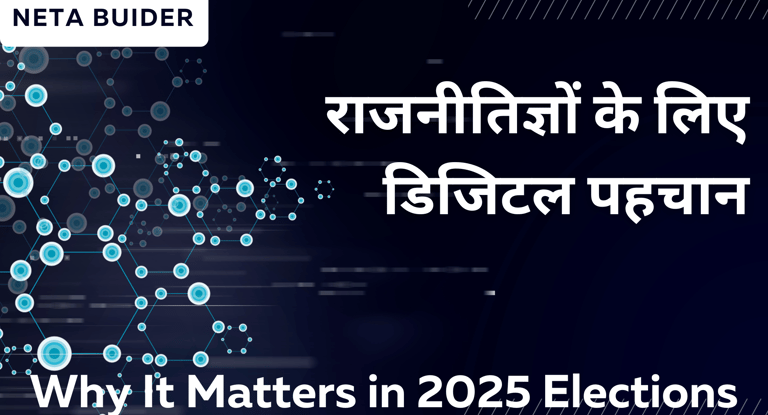राजनीतिज्ञों के लिए डिजिटल पहचान: 2025 चुनावों में इसका महत्व *Digital identity of politicians*
In the 2025 elections, digital identity has become crucial for political leaders. Learn how digital IDs, Aadhaar linking, and AI technologies are influencing electoral strategies. *2025 elections and digital ID*n*Digital voter ID system*
CEO - Kaka Enterprises Ravi S Mishra Email - ceo@kakaenterprises.in
5/1/20252 min read


राजनीतिज्ञों के लिए डिजिटल पहचान: 2025 चुनावों में इसका महत्व
2025 के चुनावों में राजनीतिक नेताओं के लिए डिजिटल पहचान का महत्व बढ़ गया है। जानिए कैसे डिजिटल आईडी, आधार लिंकिंग, और AI तकनीक चुनावी रणनीतियों को प्रभावित कर रहे हैं।
राजनीतिज्ञों की डिजिटल पहचान, 2025 चुनाव और डिजिटल आईडी, आधार और वोटर आईडी लिंकिंग, चुनावी रणनीति में AI का उपयोग, डिजिटल वोटर आईडी प्रणाली
1. प्रस्तावना: डिजिटल पहचान का उदय
डिजिटल युग में हर क्षेत्र में तकनीकी प्रगति हुई है, राजनीति इससे अछूती नहीं रही। राजनेताओं के लिए अब सिर्फ जनता से मिलना-जुलना या जनसभा करना ही पर्याप्त नहीं है, बल्कि एक मजबूत डिजिटल पहचान बनाना और बनाए रखना भी जरूरी हो गया है। डिजिटल पहचान का मतलब है—एक ऐसा ऑनलाइन चेहरा जो सोशल मीडिया, सरकारी पोर्टल, वेबसाइट्स और विभिन्न डिजिटल माध्यमों के जरिए जनता के सामने प्रस्तुत होता है। *Aadhaar and voter ID linking*
2. आधार और वोटर आईडी का एकीकरण
भारत निर्वाचन आयोग ने मतदाता पहचान पत्र को आधार से जोड़ने की योजना बनाई है ताकि फर्जी वोटिंग और डुप्लीकेट वोटर लिस्ट को खत्म किया जा सके। 2025 चुनावों में यह प्रक्रिया निर्णायक भूमिका निभा सकती है। यह न केवल पारदर्शिता को बढ़ाता है, बल्कि मतदाता डेटा को सुरक्षित और सटीक बनाता है। *Use of AI in electoral strategy*
3. डिजिटल वोटर आईडी प्रणाली
ई-EPIC (इलेक्ट्रॉनिक वोटर आईडी कार्ड) को भारत सरकार ने 2021 में लॉन्च किया था लेकिन 2025 में इसका व्यापक उपयोग देखा जाएगा। यह डिजिटल कार्ड न केवल क्यूआर कोड युक्त होता है, बल्कि इसे मोबाइल में स्टोर कर दिखाया जा सकता है।
4. चुनावी रणनीति में AI और डेटा एनालिटिक्स का उपयोग
AI और डेटा एनालिटिक्स का उपयोग करके अब राजनीतिक दल यह जान सकते हैं कि किस क्षेत्र में किस मुद्दे की बात करनी चाहिए, किन मतदाताओं को टार्गेट करना चाहिए और किस माध्यम से प्रचार अधिक प्रभावी हो सकता है। यह स्मार्ट कैंपेनिंग का युग है।
5. सोशल मीडिया और ऑनलाइन ब्रांडिंग
डिजिटल पहचान में सबसे बड़ा योगदान सोशल मीडिया का है। फेसबुक, ट्विटर (अब X), इंस्टाग्राम, यूट्यूब और अब छोटे शहरों में तेजी से बढ़ते लोकल प्लेटफॉर्म्स जैसे ShareChat और Koo पर उपस्थिति जरूरी हो गई है। एक नेता की विश्वसनीयता और लोकप्रियता अब उसके डिजिटल फॉलोअर्स और इंगेजमेंट से मापी जाती है।
6. डिजिटल कैम्पेनिंग और चुनौतियाँ
डिजिटल कैंपेनिंग में पारदर्शिता जरूरी है लेकिन साथ ही साथ फेक न्यूज, डीपफेक वीडियोज और गलत सूचना फैलाने की घटनाएं भी बढ़ी हैं। नेताओं को अपनी डिजिटल पहचान की सुरक्षा सुनिश्चित करनी होगी।
7. साइबर सुरक्षा और व्यक्तिगत डेटा की सुरक्षा
डिजिटल पहचान के साथ ही साइबर हमले और डाटा लीक की घटनाएं भी सामने आ रही हैं। राजनीतिक दलों और नेताओं को मजबूत साइबर सिक्योरिटी इंफ्रास्ट्रक्चर अपनाना होगा ताकि उनका डेटा सुरक्षित रहे।
8. वोटर से संवाद का नया तरीका
डिजिटल टूल्स जैसे वॉट्सऐप ग्रुप्स, टेलीग्राम चैनल्स, लाइव सेशन, पोल और चैटबॉट्स ने नेताओं को मतदाताओं से सीधे संवाद करने का एक नया प्लेटफॉर्म दिया है।
9. डिजिटल पहचान और चुनावी पारदर्शिता
जैसे-जैसे डिजिटल पहचान मजबूत होती जा रही है, चुनावों में पारदर्शिता भी बढ़ रही है। वोटर को यह पता चल पा रहा है कि उनका नेता क्या सोचता है, किस नीति पर काम कर रहा है और कितनी जवाबदेही निभा रहा है।
10. निष्कर्ष: भविष्य की दिशा
डिजिटल पहचान अब सिर्फ एक विकल्प नहीं बल्कि आवश्यकता बन चुकी है। 2025 के चुनाव डिजिटल ट्रांसफॉर्मेशन के युग का प्रतिनिधित्व करेंगे, और जो नेता डिजिटल रूप से सक्षम होंगे वही मतदाताओं का विश्वास जीत पाएंगे।
*Digital Identity for Politicians: Why It Matters in 2025 Elections*
Digital Identity for Politicians: Why It Matters in 2025 Elections
1. Introduction: The Rise of Digital Identity
In the digital age, every sector is evolving, and politics is no exception. A strong digital identity has become essential for political leaders. It means maintaining a visible, credible, and interactive presence across various digital platforms such as social media, official websites, and e-governance portals.
2. Integration of Aadhaar and Voter ID
The Election Commission of India is actively linking voter IDs with Aadhaar to remove duplicate entries and increase the authenticity of electoral rolls. This integration is expected to play a major role in 2025, ensuring cleaner and more transparent elections.
3. The Digital Voter ID System
The e-EPIC initiative allows voters to download their voter ID in a digital format. It includes a secure QR code and can be accessed via mobile phones, ensuring greater convenience and verification accuracy.
4. Use of AI and Data Analytics in Electoral Strategy
With the help of AI and data analytics, political parties can now design targeted campaigns. They analyze demographics, behavioral patterns, and regional issues to deliver the right message to the right audience at the right time.
5. Social Media and Online Branding
Social media has become the heart of digital identity. Politicians are now building their personal brands on platforms like Facebook, X (formerly Twitter), Instagram, and YouTube. A politician’s digital influence is measured by their follower count and engagement rate.
6. Challenges of Digital Campaigning
Despite the advantages, digital campaigning comes with risks. The spread of fake news, misuse of deepfake technologies, and disinformation can harm political reputations and mislead voters.
7. Cybersecurity and Protection of Personal Data
As political identities become digital, they become vulnerable to cyber threats. Leaders and parties must invest in strong cybersecurity protocols to protect sensitive data and ensure the integrity of communication channels.
8. New Channels of Voter Communication
WhatsApp groups, Telegram channels, live sessions, opinion polls, and automated chatbots have created new ways for politicians to connect with voters. These tools allow two-way communication and increase transparency.
9. Digital Identity and Electoral Transparency
With a strong digital identity, voters are better informed about a leader’s policies, activities, and performance. This leads to greater accountability and transparency in the democratic process.
10. Conclusion: The Way Forward
In the 2025 elections, digital identity will not be optional—it will be foundational. Politicians who embrace technology and use it effectively will not only gain a competitive edge but will also be more trusted and accessible to their voters.
